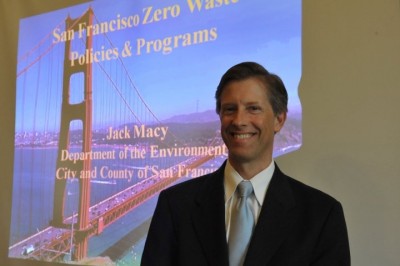 Photo: Stuart HerbertIt seems like almost every day I get something in my inbox about how technology is going to make cities better places to live.
Photo: Stuart HerbertIt seems like almost every day I get something in my inbox about how technology is going to make cities better places to live.
Just this morning, IBM announced a partnership with the IT company Telvent to create a smarter traffic-management system specifically designed for smaller cities. From the press release:
The solution can integrate and analyze data traffic control, road sensors, bus schedules, real-time GPS location and IBM’s advanced analytics. For example, a small city could tap data from GPS devices in sensors embedded in the roadway. They can analyze the information with sophisticated algorithms to predict traffic jams around a special event or large construction project before they happen.
The IBM-Telvent product is part of a mushrooming technology sector that promises to make cities smarter, more livable, and more energy-efficient. It’s being pioneered by megacorporations including Cisco, which is partnering in the construction of an entire city — PlanIT Valley — to pilot and experiment with the technology.
But there are growing concerns about privacy and corporate control of municipalities as the new, data-driven cities model emerges. As reported yesterday in Fast Company, the Institute for the Future has just released a report, “The Future of Cities, Information, and Inclusion,” (funded by the Rockefeller Foundation) that raises those very questions. From Fast Company:
Who will own the brains of smart cities — citizens or corporations? At stake is an impending massive trove of data, not to mention issues of privacy, services, and inclusion. The battle may be fought in the streets between bands of Jane Jacobs-inspired hacktivists pushing for self-serve governance and a latter-day Robert Moses carving out monopolies for IBM or Cisco instead of the Triborough Bridge Authority. Without a delicate balance between the scale of big companies and the DIY spirit of “gov 2.0” champions, the urban poor could be the biggest losers. Achieving that balance falls to smarter cities’ mayors, who must keep the tech heavyweights in check and “frame an agenda of openness, transparency and inclusiveness.”
Coders and community activists around the country are teaming up to create tools that take advantage of mobile technology to involve citizens in their communities. The problem with many of their solutions is that it’s hard for them to achieve the critical mass that they need to serve a wider population.
Being taken into the fold of a corporation like IBM or Cisco might seem like a great way for some of these ideas and their inventors to flourish.
But getting sucked up by a massive corporate structure, while it means a terrific payday for a digital entrepreneur, doesn’t guarantee a bright future for a product. The imminent death of the social bookmarking service Delicious at the hands of Yahoo yesterday was a depressing reminder of that truth.
Yahoo acquired Delicious back in 2005, and its inventor, Joshua Schachter, was pretty stoked at the time. But now Yahoo is looking more and more like a staggering internet dinosaur, and the community-friendly, evolutionarily adept Delicious is a casualty.
Let’s hope the future of smarter tech in cities doesn’t follow the same trajectory.




